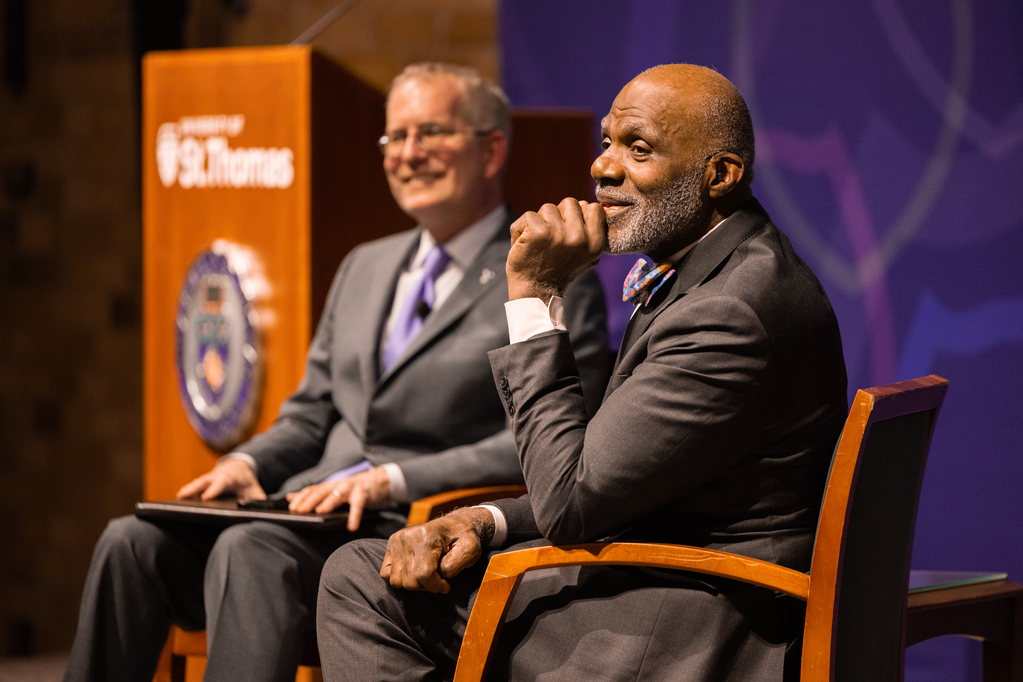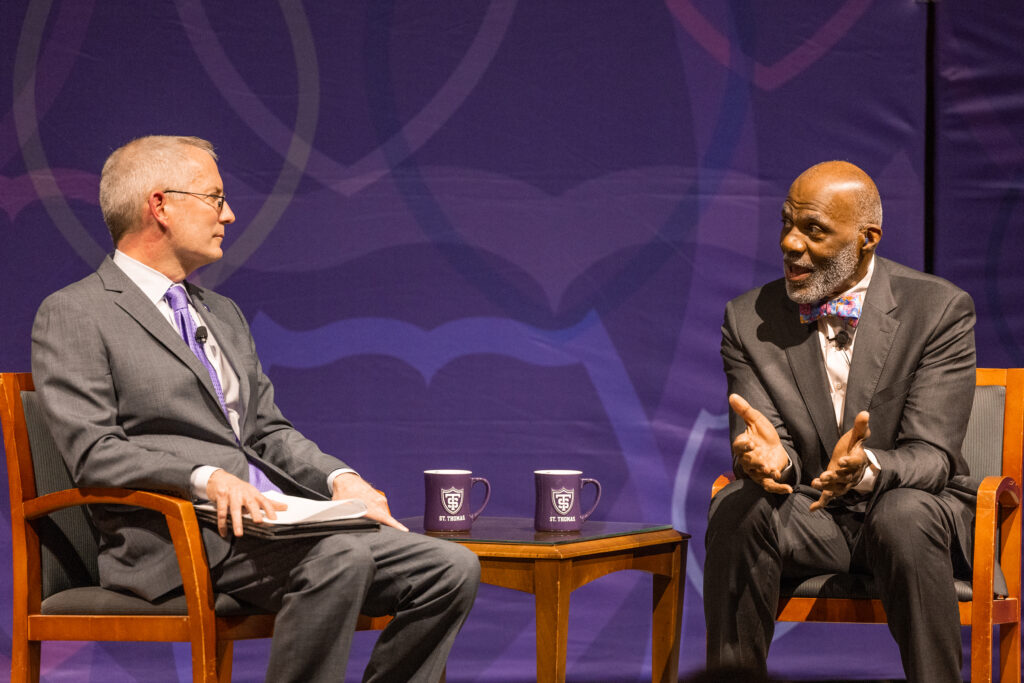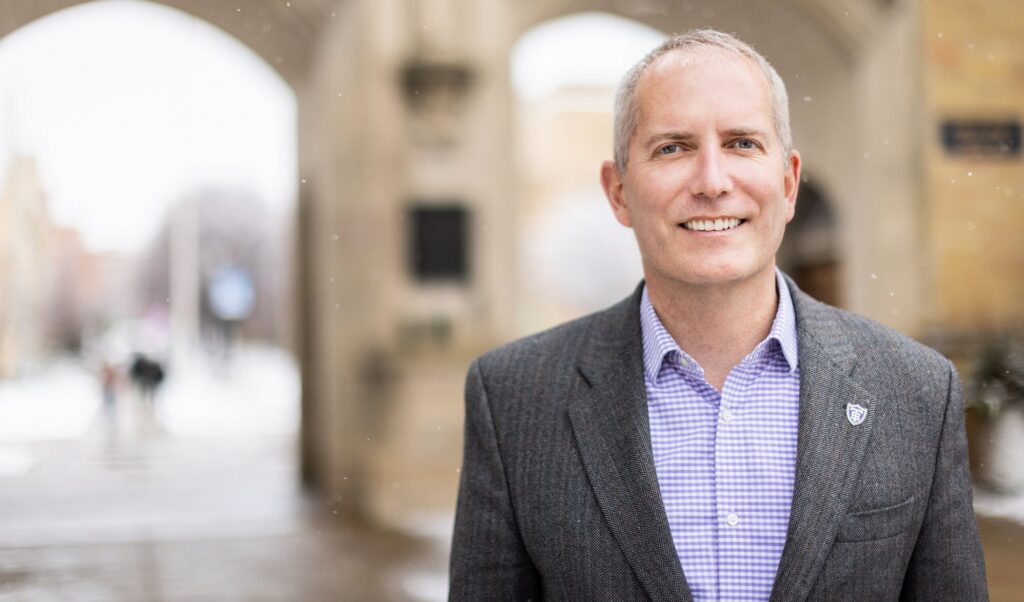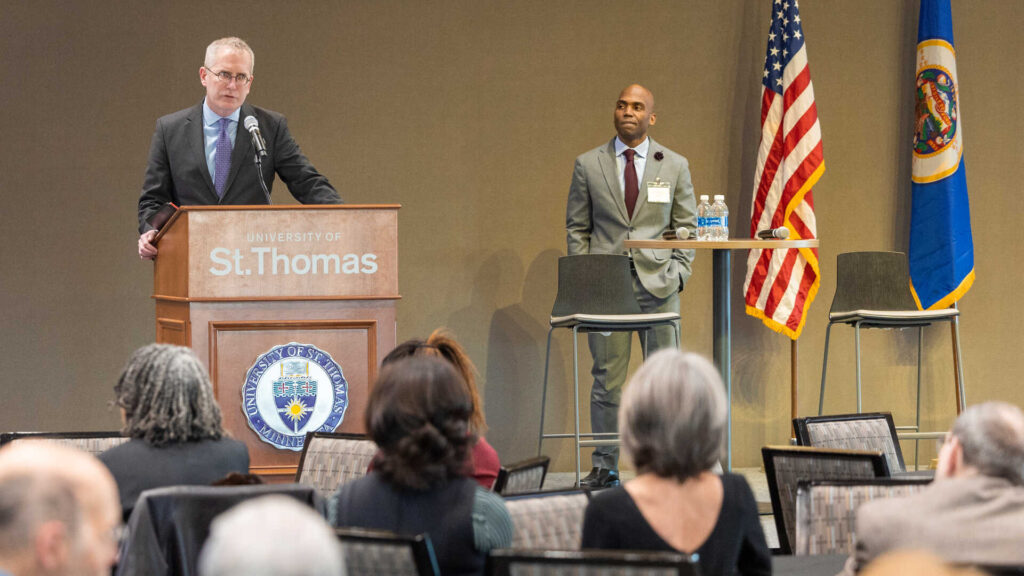Archbishop Hebda, Senator Klobuchar, Mayor Carter, Chair Ryan, Chair-Elect Kozlak, President Emeritus Dease, President Sullivan, trustees, faculty, staff, alumni, students, friends and family: Thank you so much for being here today. I appreciate the help and encouragement this community has shared with me over the past months. It continues to energize me and inspires hope and confidence for the journey ahead. In particular, I want to thank our Board of Trustees for your leadership and for the faith you have shown in me, and I want to thank my wife Maureen and our daughters Sophia, Lila and Ava for your support on this journey.
Being called to the noble work of education is a gift that I will never take for granted, and the opportunity to lead the university I love and to which I have dedicated my career fills me with a gratitude that is difficult to put into words.
To my friends and family members who have traveled to be with us today: Please know how thankful I am for all the ways you’ve helped form and sustain me over the years. Like it or not, you are part of the St. Thomas community now, so I’m going to have to start asking you for money. Just a heads-up.
To our elected officials, community leaders, and business leaders who have joined us today: St. Thomas wants to be your partner in securing a brighter future for our city, our state, our region, and beyond. Our commitment reflects our shared mission to build a better Minnesota – one that is strong, vibrant, and inclusive. We are committed to strengthening our partnership, we are listening, and we are ready to put in the work.
To our many generous benefactors who have been so vital to our success, the most meaningful expression of our gratitude is our commitment to invest in our students with the same generosity that you’ve modeled so powerfully.
To my colleagues who work alongside me every day, please don’t let our big plans obscure a simple truth: The most important person to St. Thomas’ future is the student standing right in front of you in the present. I am consistently inspired by your dedication to our students. And that dedication is the key to our future.
And finally, to our students: Our No. 1 priority is to be wise and faithful stewards of the confidence you have shown in St. Thomas. We see you, and you matter. Your future is our legacy, and it is such an honor to be invited to be part of your story.
We are continuing our journey from being a small Catholic liberal arts college to being a comprehensive Catholic university with national visibility and global impact. We will face significant challenges on this journey, as the next few years will not be easy ones for St. Thomas or for higher education more broadly.
We know that the number of high school graduates is going to begin to decline in a couple of years. We know that artificial intelligence is going to impact our work in ways we can’t yet see. We know that we face a growing mental health crisis among young adults. We know that there will be geopolitical turmoil, economic downturns, and unanticipated disruptions to our plans. We also know that we have something unique and valuable to offer students and the world. As a Catholic university rooted in Catholic intellectual tradition, our mindset must be rooted in the instruction that appears more frequently in scripture than any other: Be. Not. Afraid.
Be not afraid – we are called to be courageous! I can’t describe, much less prescribe, all the forms of courage that will be evident within our university community over the coming years. I do know that courage will continue pushing us to lean into our mission, and our mission compels us to cultivate three values: the true, the beautiful, and the good. Truth, beauty, and goodness – these were called transcendental values by our university’s namesake, Thomas Aquinas, because they transcend human limitations, they are values in every culture, and they are available as infinite resources in God’s creation.
Aquinas is a great guide for us in this journey because his own exploration reflected our university’s aspirations today. He sought knowledge from whatever source it was available – he defied any academic tendency toward silos or self-absorption. His work relied heavily on the insights of the ancient Greeks and the wisdom of Muslim and Jewish scholars. He was not stuck in what was safe, in the conventional wisdom of the time. In fact, some of his ideas were deemed so unsettling that they were condemned by his local bishop before eventually being embraced. He was a scholar of courage.
What does it look like if we lean into the true, the beautiful, and the good?
First, we must have courage in cultivating what is true.
This means we must be committed to creating an environment conducive to cultivating what is true. My view of the world might feel true to me, but that doesn’t make it true. I have a powerful ability to cling to beliefs about the world that place me in a favorable light and help me avoid grappling with hard questions.
I grew up just outside Chicago, and I had great admiration for Martin Luther King Jr. based on what I learned about him in school. I knew quite a bit about the civil rights struggles he led in Selma, Birmingham, Montgomery, and other southern cities. I was an adult before I learned about the marches King led in Chicago, where he encountered what he described as the most hostile crowds of his life.
Rather than target a southern society that advertised its segregation policies for all to see, he came to my city to protest deeply embedded real estate practices, such as steering and redlining that kept Black Americans locked in impoverished neighborhoods.
It’s easier to embrace the truth about Dr. King when he helps me feel morally righteous and confident in my place on the right side of history. I would never refuse service to someone based on the color of their skin. I would never turn the dogs loose on peaceful protestors.
It’s more difficult to reckon with the truth about Dr. King when he starts asking what I’m doing about the inequality in my own community.
Truth-seeking is not always comfortable, but it must be at the heart of a university. So, if we are committed to creating an environment for truth-seeking at St. Thomas, that means we will value:
- Intellectual and ideological diversity over uniformity
- Rigorous debate over easy assumptions
- Academic freedom even when it makes us uncomfortable
- Civility and respect as hallmarks of our daily lives
- Committing to the building of relationships across our many disagreements, resisting the urge we see too frequently in the broader world to make agreement a prerequisite for relationship
As a university, our goal is to reach beyond what might feel comfortable in order to help each other grow in our understanding of the world and the ways in which we can contribute to its flourishing. And yes, that means faculty and staff need to be vulnerable enough to allow our students to help us grow in our understanding of the world. We rightfully celebrate the growing diversity of our St. Thomas community, and that means faculty and staff must stand ready to have our own perspectives shaped by life experiences that are not our own. Academic freedom is a nonnegotiable bedrock of our work, but academic freedom is not a justification for those of us in privileged positions to avoid difficult conversations and opportunities for growth.
Recently I had lunch with one of our elected officials. He told me that one of St. Thomas’ most important strengths is the diversity of views represented in our university. He said that is so important for young people to learn in an environment where their own ideas and perspectives will be tested and stretched – that is what will prepare them for influence in the world.
I don’t need to recount for you all the data that confirm the growing mistrust between combatants in the great American red/blue divide. So let me be clear: The University of St. Thomas is an academic community made up of people who do not think, believe, vote, or view the world the same, and that’s a powerful asset, not a liability.
None of us possess a monopoly on truth. As a university community, we have to recognize that the cultivation of truth is a journey that is often messy and frustrating, but deeply meaningful – and it’s a journey best made together. Can we be a radically inclusive community marked by kindness, humility, and respect – while embracing without apology an intellectually rigorous environment of spirited debate, productive disagreement, and broad engagement with important ideas? We can, and we will.
Second, we must have courage in cultivating what is beautiful.
St. Thomas is among the most beautiful universities in America. Whether you’re gazing out at the main quad on a quiet winter day, walking near the Grotto on south campus, listening to our student-athletes practice on our fields, seeing the sun beam through the law school’s glass-enclosed atrium, or watching nervous and excited students march through the Arches for the first time, there is beauty all around us. Beauty emanates daily from our music practice rooms and performance spaces. It’s found in the theorems our students learn, the natural properties they explore, the truths they discover.
Earlier this year I was walking through our Anderson Student Center and noticed a crowd forming. Some of our international students had invited the community to taste coffee from their home countries. There were samples from Vietnam, Kenya, Italy, and Colombia. I tried the coffee from Colombia and struck up a conversation with the student who had poured me a cup. She was from a town near Bogota. There was another student helping, and I asked her if she was from Colombia too. “No,” she said, “I’m from up near Brainerd, but I knew my friend needed help.” There was a third student helping, so I asked him where he was from, and he said, “Oh I’m from farther south.” I asked where. He answered, “Lakeville.” Well, technically that is south, I suppose.
But here’s why I wish you could all have been there with me. Our students taking care to prepare coffee reflective of their own culture, sharing it with the community, and their friends – friends with different backgrounds, life experiences and perspectives on the world – realizing on their own that they needed to come help. That scene was stunningly beautiful. It was a regular weekday afternoon. And I’ll never forget it. That’s the power of beauty.
Beauty is at the heart of our mission. In fact, our commitment to cultivating the good and the true is compromised to the extent our commitment does not also include the cultivation of beauty. One reason the arts are so central to Catholic tradition is because we perceive truth and goodness through our senses and imagination, not just as rational propositions.
We have to help our students recognize that our endeavors cannot be evaluated solely in terms of a cost-benefit analysis. When we fully understand how we are wired, what we’re created for, we know, as Dostoevsky observed, that beauty will save the world.
Research is confirming that beauty is essential to our well-being. A University of Michigan psychologist recently found that a high appreciation of beauty promotes recovery from depression and anxiety. And a UC Berkeley psychologist observed that the experience of awe in response to beauty helps us push back against self-absorption by getting us to recognize our place in a much bigger world. Another recent study showed that students who kept weekly journals describing beauty they observed gained in hopefulness by the end of the semester. Put simply, appreciating beauty is good for us.
Universities are becoming more transactional, more focused on providing necessary job skills as efficiently as possible. Efficiency is important. Preparing our students for professional success is important. But we are also called to help bring forth beauty.
We need to recognize the weight and importance of the beauty we encounter on our campus, in our labs, in our classrooms, in our conversations, and in the friendships we build. Can we cultivate a deep and abiding appreciation for the beauty all around us, and can we equip each other to carry that appreciation into the wider world beyond our campus? We can, and we will.
Third and finally, we must have courage in cultivating what is good:
Goodness in this sense refers to the extent to which a person is able to fulfill their purpose. The most important way in which St. Thomas cultivates the good is by helping every one of our students discern their vocation – that is, how their gifts, beliefs, values and life experiences can coalesce in a way that helps meet the world’s needs. Everyone has a vocation. Everyone.
When we view goodness through a Catholic lens, fulfilling one’s purpose is inescapably relational because the common good is inescapably relational.
The common good is a key concept in how we articulate our mission, but it’s not a cliché or a tag line, it’s a claim about reality that goes back to Aristotle and has been central to Catholic social teaching. It refers to the social conditions that allow each person to reach their fulfillment, recognizing that I cannot find fulfillment in myself, but only through the fact that I exist with and for others. And this understanding of the common good is absolutely vital to our vision of education.
When I was just starting my career as a professor, I was teaching a large class – 100 students in my section. I was growing in my confidence as a lecturer, and it was invigorating to have that many students. I really didn’t know the students. My class sessions could best be described as a performance. The students were my audience.
And then one of those students, very suddenly and unexpectedly, died. I didn’t know him – until that moment, he was simply a member of the audience. Sitting at his funeral, I listened to his friends and family members describe through tears and sobs what he meant to them, what made him unique as a person, why he mattered so deeply to so many people. I realized then that every single one of those 100 students in my class were the center of someone’s world. They weren’t my audience. They were fiercely loved sons and daughters, sisters and brothers, best friends, moms and dads, each of whom possessed remarkable gifts and reasons they mattered that had absolutely nothing to do with their grades or their resumes. If I believe that to be true, how should it matter to the teacher I aspire to be? If we believe that to be true, how should it matter to the university we aspire to be?
Here’s what I know: If we aspire to cultivate the good by helping our students discover and live out their purpose, that will not happen as an arm’s length transaction. That will only happen through relationship.
Pope Francis has put relationship at the center of his ministry. He implores all people of good will to help push back against a culture of indifference by building what he refers to as a “culture of encounter” in which every person is seen, known, and loved, in which we all have eyes that notice, ears that listen, and voices that encourage.
There are so many exciting initiatives happening at St. Thomas. But if we become a university that our students experience as a set of transactions, even our most impressive achievements and most ambitious strategic plans will be a waste. Our students must experience genuine encounter during their time with us.
A few months ago, I received an email from the father of one of our freshman students. He wanted me to know that, during those weeks when a new college student is trying to adjust to life away from home for the first time, his son received a great gift. Every day when he walked in for lunch, one of our food service colleagues would greet him by name, begin making his favorite sandwich before he ordered it, and say something that made him smile. That’s what the son wanted his dad to know about St. Thomas.
That’s the culture of encounter, and that’s the environment in which we will be able to cultivate the good by helping our students discover their purpose and vocation. Can we aspire to ensure that every member of our community – without exception – has the unmistakable experience of being seen and known and loved during their time at St. Thomas? We can, and we will.
Truth, beauty, goodness. Can we achieve a deeper awareness of how our work at St. Thomas contributes to their realization and how these values connect to each other? I don’t have all the answers, but I do think it’s worth investing some time and modest resources in helping us think through what it looks like – and what it feels like – to cultivate truth, beauty and goodness at St. Thomas. To that end, I’m happy to announce a universitywide initiative that will invite all members of our community to experience the many ways in which truth, beauty, and goodness are lived out each day across our campus. Through a series of discussions, performances, and experiences, we’ll explore ways that all of us in our unique roles can nurture these values. Participation in the initiative will be open to all but required for none. Our colleagues Mark McInroy from theology and Wendy Wyatt, our vice provost, have generously agreed to co-direct this initiative. Our objective is to enrich, stretch, and encourage the St. Thomas community in ways that can help us resist the fragmentation, commodification, and polarization of knowledge. And as someone who follows higher education trends very closely, I can tell you that is no easy feat. But we can do this. We will do this.
I came to St. Thomas 18 years ago to join the law faculty, just a few years after the law school had opened its doors. What impressed me at the time was that my new colleagues were not interested in replicating what other law schools were doing. They were interested in building for the future, in creating something new, in upending the conventional wisdom about what a law school could offer to the world.
In the years since, I’ve discovered that same mindset operating in every corner of the university. We’re not in the imitation game. We’re all about impact. Our founder, Archbishop John Ireland, famously implored us to “ever press forward,” and we’ve taken that so seriously that we just might be the newest 138-year-old university the world has ever seen.
Stepping up to meet an uncertain future can be uncomfortable, even scary. Be not afraid. Courage will empower us to do what is necessary to promote the lifelong flourishing of our students. And as we become a university with a national reputation, our mission will define that reputation. A reputation for showing up and accompanying our students on their journeys in a world that is changing at dizzying speed. A reputation for helping form our students in body, mind, and spirit, equipping them to be the morally responsible leaders the world so desperately needs. A reputation for ensuring that every student – every student – experiences a strong sense of belonging and the confidence that comes from being seen and known and loved.
Paying attention to truth, beauty, and goodness is not a distraction from the difficult tasks before us. It’s a reminder of why our work matters. Why courage will carry us forward. Why we are called to bring connection where there’s separation, integration where there’s fragmentation, relationship where there’s isolation, and encounter where there’s indifference. If our commitment to St. Thomas today can help ensure that future generations will experience these values tomorrow, I’m all in. I hope you are too.
Be not afraid. Be not afraid. St. Thomas, we can do this. And we will. Thank you.






